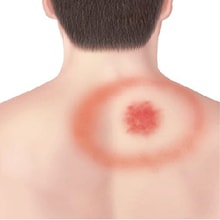Lyme disease is a bacterial infection that is transmitted by Ticks. This disease affects half a million people in the United States per year. Although antibiotics are needed to treat the disease, many people still feel the effects after months to even years. Some researchers at MIT have found a protein in sweat that protects against Lyme disease. About 1/3 of the population in the United States have this protein in their genes. It is in the hopes of the researchers that they will be able to use the protein in order to make preventable creams or treatments for those with Lyme disease. The researchers who found this protein in the genes of people with and without Lyme disease primarily found secretoglobin, SCGB1D2 are a family of proteins found in tissues of organs and play a role in immune responses. The researchers are using the SCGB1D2 in order to test against the disease in mice.
Personally, I know a lot of people with Lyme disease and some of those people still have affects from the disease after taking the antibiotics. This is a groundbreaking discovery because it has the potential to help many people feel better and increase their health.
Article Link: https://news.mit.edu/2024/protein-found-human-sweat-may-protect-against-lyme-disease-0319
Additional Link: https://www.cdc.gov/lyme/index.html#:~:text=Lyme%20disease%20is%20the%20most,bite%20of%20infected%20blacklegged%20ticks.

The discovery of a protein in sweat that protects against Lyme disease holds promise for developing preventive treatments and creams, potentially offering relief to those affected by the long-term effects of the disease.
ReplyDeleteVery neat. This sort of breakthrough will be especially useful for those who live on or near woodlands, as its one less reason to be scared to simply be outside or on a hike. Interested to see how this will develop.
ReplyDeleteVery cool article, Abigail! I also shared a similar one on sweat providing protection against Lyme's disease. As someone who also knows people who've had the disease, and someone who was exposed to it as a child, it is most definitely not fun. Seeing new research on helping prevent it, as well as treat the people whose antibiotics don't work, is incredibly special. Thank you for sharing!
ReplyDelete